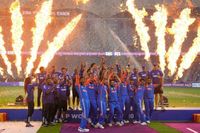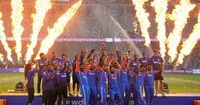Tempers flared and history was made at the Dubai International Cricket Stadium on September 28, 2025, as India clinched their ninth Asia Cup title—yet the night will be remembered just as much for the on-field triumph as for the off-field controversy that followed. In a dramatic final, India defeated archrivals Pakistan by five wickets, with Tilak Varma's composed half-century steering his team to victory. But the post-match events cast a long shadow over the celebration, as the Indian team refused to accept the Asia Cup trophy from Mohsin Naqvi, the Asian Cricket Council (ACC) chief, Pakistan Cricket Board (PCB) chairman, and Pakistan’s federal interior minister.
The highly anticipated final was the third clash between India and Pakistan in this edition of the Asia Cup, each encounter thick with tension. Just four months prior, the two nations had been embroiled in a brief but intense military conflict, sparked by a deadly attack in Pahalgam, Indian-administered Kashmir. That backdrop made every ball, every gesture, and every handshake—or lack thereof—charged with significance.
When the match concluded around 10:30pm local time, Indian fans expected the usual jubilant trophy presentation. Instead, uncertainty reigned. The post-match ceremony was delayed for over ninety minutes, with the Pakistan team, led by captain Salman Agha, arriving late. As the stadium lights glared and millions watched on television, an official quietly removed the Asia Cup trophy from the presentation podium without explanation. The air was thick with confusion: where was the trophy, and what was happening behind the scenes?
Eventually, Indian players Kuldeep Yadav, Abhishek Sharma, and Tilak Varma collected their individual awards for bowling, player of the tournament, and player of the match, respectively. But these were handed out by sponsor representatives, not by Naqvi, who stood on stage but was neither acknowledged by the Indian cricketers nor offered congratulations. Simon Doull, the former New Zealand cricketer conducting the ceremony, summed up the moment: “I have been informed by the Asian Cricket Council that the Indian cricket team will not be collecting their awards tonight. So that does conclude the post-match presentation.”
What followed was a surreal sight: the Indian team celebrating on the field, pretending to hold an invisible trophy, grinning for photos with nothing but air in their hands. The real Asia Cup trophy, usually the centerpiece of such a night, was nowhere to be seen. As of late Sunday, the Indian team had not received it, nor their winners’ medals.
Indian captain Suryakumar Yadav did not mince words in the post-match press conference. “This is one thing which I have never seen since I started playing cricket, started following cricket – a champion team is denied a trophy, that too a hard-earned one,” Yadav remarked. “I feel we deserved it. And I can’t say anything more.” He added that the decision to refuse the trophy was made collectively by the team: “No one told us to do it.”
The Board of Control for Cricket in India (BCCI) was quick to clarify its stance. “We have decided not to take the Asia Cup trophy from the ACC chairman, who happens to be one of the main leaders of Pakistan,” said Devajit Saikia, BCCI secretary, in comments to India’s ANI news agency. “But that does not mean that the gentleman will take away the trophy with him, along with the medals. So it is very unfortunate and we hope that the trophy and the medals will be returned to India as soon as possible.” Saikia further announced that India would launch a formal protest at the upcoming ICC conference in Dubai this November.
Pakistan’s captain Salman Agha was openly critical of India’s actions, calling them disrespectful. “Good teams don’t do what they did today (by refusing to accept the trophy from Naqvi),” Agha said. “We went to pose with the trophy on our own because we wanted to fulfil our obligations. We stood there and took our medals. I don’t want to use harsh words but they’ve been very disrespectful.” Agha lamented the message such behavior sends to young fans in both countries: “If a kid is watching in India or Pakistan, we’re not sending them a good message. People think of us as role models, but if we’re behaving like this, we’re not inspiring them.”
The controversy was not limited to the trophy snub. Throughout the tournament, Indian players had refused to shake hands with their Pakistani counterparts—at the coin toss, after matches, and even after the final. The gesture, or lack thereof, did not go unnoticed. Pakistani pacer Haris Rauf responded to heckling from Indian fans with gestures referencing the May 2025 military clashes, while Indian captain Yadav dedicated the team’s first win in the tournament to the victims of the Pahalgam attack and the Indian armed forces. “We stand by the victims of the families of Pahalgam terror attack. We express our solidarity. Want to dedicate the win to all our armed forces who showed a lot of bravery,” Yadav stated after the opening game.
The Asia Cup, intended as a celebration of cricketing excellence, instead became a stage for the ongoing political and diplomatic rift between the two nuclear-armed neighbors. The tension was palpable online as well, with Indian Prime Minister Narendra Modi posting on X (formerly Twitter): “#OperationSindoor on the games field. Outcome is the same – India wins! Congrats to our cricketers.” Mohsin Naqvi shot back, “If war was your measure of pride, history already records your humiliating defeats at Pakistan’s hands. No cricket match can rewrite that truth. Dragging war into sport only exposes desperation and disgraces the very spirit of the game.”
Historically, cricket has sometimes served as a diplomatic bridge between India and Pakistan. Leaders like Pakistan’s President Mohammad Zia-ul-Haq and Indian Prime Minister Manmohan Singh have used cricket matches as venues for dialogue and peace overtures. Yet, as Mathew John Moolakkattu, a scholar of cricket diplomacy, observed, “Given the ongoing tensions between India and Pakistan, it was perhaps inevitable that these strains would surface in arenas that connect both nations, such as cricket.”
For now, the Asia Cup trophy remains unclaimed by its rightful winners, a glaring symbol of the broader standoff. The Indian team’s protest is set to echo into the next ICC conference, with the fate of the trophy and medals still uncertain. On a night meant for sporting glory, it was the politics of the subcontinent that took center stage, leaving fans and players alike wondering when, or if, the spirit of the game will prevail over the weight of history.



